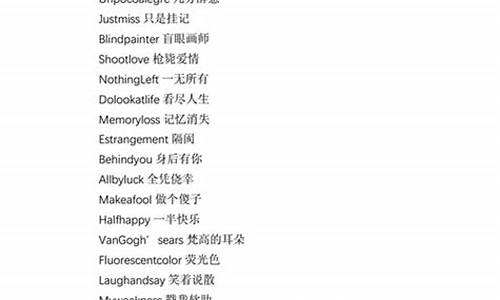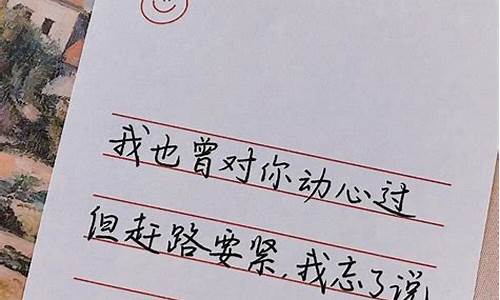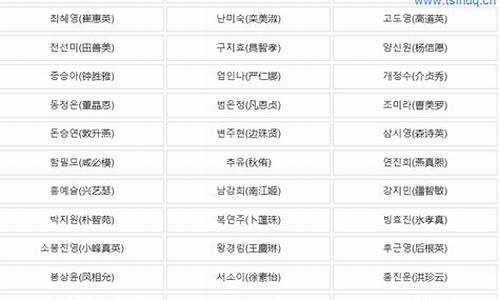您现在的位置是: 首页 > 励志语录 励志语录
英语句子开头单词都有哪些_英语句子开头单词
tamoadmin 2024-09-25 人已围观
简介1.在什么情况下英语单词开头是大写的?2.英语的基本开头句子单词有哪些 ?! 中英一起帮我解答好吗?3.句子的英语单词怎么写?4.小学英语长句子单词5.英语句子开头的那些都是什么意思?不定冠词有"a和an"两种形式。"a"用在以辅音开头的词前,"an"用在以元音开头的词前。判断一个词是以元音开头还是以辅音开头,是根据读音而不是根据字母。一般情况下,开头字母是a、e、f、h、j、l、m、n、o、r、
1.在什么情况下英语单词开头是大写的?
2.英语的基本开头句子单词有哪些 ?! 中英一起帮我解答好吗?
3.句子的英语单词怎么写?
4.小学英语长句子单词
5.英语句子开头的那些都是什么意思?

不定冠词有"a和an"两种形式。"a"用在以辅音开头的词前,"an"用在以元音开头的词前。判断一个词是以元音开头还是以辅音开头,是根据读音而不是根据字母。一般情况下,开头字母是a、e、f、h、j、l、m、n、o、r、s、x前用不定冠词an。
1. 用于可数名词的单数形式前,表示"一"
There is a tiger in the zoo.
动物园里有一只老虎。
2. 表示一类人和东西
A tiger can be dangerous.
老虎可能有危害性。
3. 表示"某一个"的意思
A gentleman wants to see you.
有一位先生要见你。
4. 表示"同一"的意思
They are nearly of an age.
他们几乎同岁。
The two shirts are much of a size.
这两件衬衫大小差不多。
5. 表示"每一"的意思
We go swimming four times a week.
我们每周去游泳四次。
6. 用在作表语的单数可数名词前,表示身份、职业
My mother is a teacher.
我妈妈是教师。
7. 第一次提到的人或事物,但不特别指明是哪一个
Long long ago there was an old king who had a very beautiful daughter.
很久很久以前,有一个年老的国王,他有一个非常美丽的女儿。
8. 在英国英语中,以"h"开头的多音节词,如第一个音节不重读,其前亦可用"an"
There is a hotel near here.
这附近有一家旅馆。
9. 在such a,quite a句式中
He is quite a good actor.
他是一个相当好的演员。
Don't be in such a hurry.
不要如此匆忙。
10. 在感叹句 what...的句式中
What a pretty girl she is!
她是一个多么漂亮的女孩呀!
用在某些表示数量的词组中:
a lot of 许多
a couple of 一对
a great many 很多
a dozen 一打(但也可以用 one dozen)
a great deal of 大量 [编辑本段]定冠词的用法 1. 用以特指某(些)人或某(些)事物
This is the house where Luxun once lived.
这是鲁迅曾经住过的房子。
2. 用于指谈话双方都明确所指的人或事物
Open the door, please.
请把门打开。
3. 用以复述上文提过的人或事物(第一次提到用“a或an”,以后再次提到用“the”)
Once there lived a lion in the forest. Every day the lion asked small animals to
look for food for him.
从前森林里住着一只狮子。每天这只狮子要小动物们为他寻找食物。
4. 用在序数词和形容词最高级前
January is the first month of the year.
一月份是一年当中的第一个月。
Shanghai is the biggest city in China.
上海是中国最大的城市。
5. 表示宇宙中世界上独一无二的事物
the sun 太阳 the moon 月亮
the earth 地球 the sky 天空
the world 世界
6. 指由普通名词构成的专有名词
the West Lake 西湖 the Great Wall 长城
the United States 美国 the United Nations 联合国
定冠词的用法-2
7. 表示方向、方位
in the east 在东方 in the west 在西方
in the front 在前面 at the back 在后面
in the bottom 在底部 at the top 在顶部
on the right 在右边 on the left 在左边
8. 在海洋、江河、湖泊、山脉、海峡、海湾等地理名词前
the Pacific Ocean 太平洋 the Huanghe River 黄河
the Tainshan Mountains 天山山脉 the Taiwan Straits 台湾海峡
9. 在姓氏复数前,表示一家人
The Bakers came to see me yesterday.
贝克一家人昨天来看我。
10. 和某些形容词连用,使形容词名词化,代表一类人或物
the poor 穷人 the rich 富人
the sick 病人 the wounded 伤员
the good 好人 the beautiful 美丽的事物
11. 用在表示阶级、政党的名词前
the working class 工人阶级
the Chinese Communist Party 中国***
12. 用在the very强调句中
This is the very book I want.
这就是我想要的那本书。
13. 在the more, the more比较级的句式中
The more you drink, the more you like it.
你越喝就越爱喝。
14. 表示演奏乐器时,乐器的前面要加the
play the piano 弹钢琴
play the violin 拉小提琴
[中国乐器名词前不与冠词连用:playaerhu(二胡)]
15. 某些固定的表达法
in the morning 在早上 in the afternoon 在下午
in the evening 在晚上 go to the cinema 去看**
go to the theatre 去看戏 all the year round 一年到头
on the way to 前往...去的路上
16. the加单数可数名词可以表示一类人或事物
The horse is a useful animal.
马是一种有用的动物。
注意:像这类句子还有如下两种写法
A horse is a useful animal.
Horses are useful animals.
17.在句型“动词+sb.+介词+the+身体某一部位”中要用 the,而不
用人称代词。
take sb. by the arm 抓住某人的手臂
hit sb. in the face 打某人的脸
be red in the face 脸红
be lame in the right leg 右腿瘸 等结构中,名词前要用the [编辑本段]零冠词的用法 1. 专有名词前一般不加冠词
China 中国 Europe 欧洲
Lei Feng 雷锋 William Shakespeare 威廉·莎士比亚
2. 月份、周日、节日前一般不加冠词
January 一月份 Sunday 星期日
Christmas Day 圣诞节 Thanksgiving 感恩节
National Day 国庆节 May Day 劳动节
比较: ...on a Sunday morning.
在一个星期天的早晨... (表示某一个。)
注:民族节日前要加the 如:the Spring Festival
3. 三餐、四季前一般不加冠词
I have lunch at school.
我在学校吃午餐。
Summer is the best season for swimming.
夏天是游泳的好季节。
比较: I had a big lunch yesterday.
昨天我吃了一顿丰盛的午餐。(表示某一个)
The dinner given by Mr Smith was very nice.
史密斯先生款待的晚宴真是美味。(表示特指)
比较: I will never forget the summer we spent in Hawaii.
我永远不会忘记我们一起在夏威夷度过的那个夏天。
(表示特指)
4. 进行球类运动
play basketball 打篮球 play volleyball 打排球
play football 踢足球
5. 没有特指的物质名词
This cart is made of wood.
这辆手推车是用木头作的。
比较: The wood outside was all wet.
外面的那些木头都湿了。(表示特指)
6. 没有特指的不可数抽象名词
Time is precious.
时间是宝贵的。
比较: The time of the play was 1990s.
这个剧本的时代背景是二十世纪九十年代。(表示特指)
7. 没有特指的可数名词复数形式后。
I like tomatoes.
我喜欢西红柿。
8. 山峰
Mount Qomolangma 珠穆朗玛峰
9. 固定词组
go to school 去上学 go to bed 上床睡觉
go by train 乘火车去 go by boat 乘船去
at table 在用餐 in hospital 住院
at school 求学 in school 求学
at noon 在中午 at night 在晚上
at midnight 在半夜 in town 在城里
10. 独立结构中的名词不加冠词
A boy came in, book in hand.
一个男孩进来,手上拿着书。
11. 泛指人类
Man is mortal.
人必有一。
12. 在"kind of+名词 sort of+名词"句式中
What kind of flower is it?
这是什么花?
I like this sort of book.
我喜欢这种书。
13. 指职位、头衔的词,如king,captain,president,chairman 等。
He is (the) captain of the team.
他是球队的队长。
As (the) chairman of the committee, I declare the meeting open.
作为委员会主席,我宣布会议开始。
冠词和三餐的搭配
三餐名词单独使用时,之前通常不加冠词
三餐名词之前若加形容词时则除外:
We have breakfast at eight.
我们8点钟吃早饭。
He gave us a good breakfast.
他请我们吃了一顿丰盛的早餐。
I was invited to dinner.
他们邀请我吃饭。
I was invited to a dinner given to welcome the new ambassador.
我被邀请参加欢迎新任大使的宴会。
The Scots have porridge for breakfast.
苏格兰人早餐吃粥。
The wedding breakfast was held in her father’s house.
婚礼早宴是在她父亲家举行的。 [编辑本段]介词短语与冠词 一.、当下列名词指其“主要目的”,即与其相关在行为时,要用零冠词。
at table 在进餐
at the table 在桌子旁边
at desk 在读书
at the desk 在课桌旁
at school 在上学
at the school 在学校里
in class 在上课
in the class 在班级里面
in bed 卧床
in the bed 在床上
in prison 坐牢
in the prison (因事)在监狱
in hospital 住院
in the hospital (因事)在医院
go to school 去上学
go to the school (因事)去学校
go to bed 上床睡觉
go to the bed 在床上
go to hospital 去看病
go to the hospital 去医院
二.
take place 发生
take the place 代替
in place of 代替
in the place of 在...的地方
in case of 万一
in the case of 就...来说
out of question 毫无疑问
out of the question 完全不可能
通常使用不定冠词的短语
after a while 过了一会儿
all of a sudden 突然
as a rule 通常
as a result 结果,因此
as a matter of fact 事实上
as a whole 大体上
at a loss 不知所措
in a hurry 急忙
in a way 在某种程度上
in a word 总而言之
It’s a pity that… 令人遗憾的是…
put an end to… 结束…
come to an end 结束
come to a conclusion 得出结论
have a good time 玩得愉快
have a rest 休息一下
have a cold 感冒
have a word with 和…谈一谈
keep an eye for 对…有鉴赏力
make a living 谋生
make a fire 生火
make a fool of 愚弄
take a walk 散步 [编辑本段]冠词位置 1) 不定冠词位置
不定冠词常位于名词或名词修饰语前。注意:
a. 位于下列形容词之后: such,what,many,half,
I have never seen such an animal.
Many a man is fit for the job.
b. 当名词前的形容词被副词as, so, too, how, however, enough修饰时,不定冠词应放在形容词之后:
It is as pleasant a day as I have ever spent.
So short a time.
Too long a distance.
c. quite,rather与单数名词连用,冠词放在其后。
但当rather,quite 前仍有形容词,不定冠词放其前后均可。如:quite a lot
d. 在as,though 引导的让步状语从句中,当标语为形容词修饰的名词时,不定冠词放形容词后:
Brave a man though he is,he trembles at the sight of snakes. 他尽管勇敢,可见到蛇还是发抖。
当名词被比较级形容词修饰时,不定冠词通常置于比较级形容词之后。
2) 定冠词位置
定冠词通常位于名词或名词修饰语前,但放在all, both,double,half,twice,three times等词之后,名词之前。
All the students in the class went out. 班里的所有学生都出去了。 [编辑本段]冠词与形容词+名词结构 1) 两个形容词都有冠词,表示两个不同东西。
He raises a black and a white cat. 他养了一只黑猫和一只白猫。
The black and the white cats are hers. 这只黑猫和白猫都是他的。
2) 如后一个形容词无冠词,则指一物。
He raises a black and white cat. 他养了一只花猫。 [编辑本段]冠词的使用错误 大家除了掌握使用冠词的基本规则外,还应不拘泥于规则,注意冠词的活用:
1.表示世界上独一无二的事物的名词前一般加定冠词the; 但如果名词前有修饰语,也可能用不定冠词a,an。
the world, a peaceful world
the moon, a bright moon
2. 表示一日三餐的名词前面一般不用冠词,但前面如果有了定语修饰,也可能用不定冠词a, an。
Have you had supper?
We had a wonderful supper.
3. 表示乐器的名词前一般用定冠词the, 但前面如果出现定语修饰,也可能用不定冠词a, an。
He starts his day by playing the violin.
He is playing a borrowed violin.
4. 介词与表示交通工具的名词连用表示笼统的方式,前面一般不用冠词,但如果名词的前面出现了修饰语,前面需加冠词。
He went to the station by car.
He went to the station in a black car.
5. 表示语言的名词前一般不用冠词,但后面如果出现language一词,前面需加定冠词the。
English=the English language French=the French language
6. turn用作系动词时,后面作表语的单数名词前不用冠词。
He turned writer many years later.(=He became a writer many years later.) [编辑本段]冠词口诀 冠词分为定冠、不定冠,
不定冠词a和an,“—”的含义表泛指
表示特指要用the,次序、方位、最高级
世上物体独一个,人或事物再次提
以下情况冠词免,学科球类三顿饭
名词复数表泛指,季节星期月份前
在什么情况下英语单词开头是大写的?
以下是英语句子在练习本上正确的书写方式:
壹-句子开头的第一个单词的首字母通通要大写。
例:Good afternoon! This is anapple.
单词I(我)在句中任何位置都必须大写。
如:Wang Ming and I are good mate .?
表示人名、地名等一些专有名词放在句中任何位置,其首字母都必须大写。
如:Mr. Wu , China .
贰-注意距离 英语单词的排列应整齐美观,单词与单词间以空一个字母a 的距离为宜,句子与句子之间空两个字母的距离为宜。
一句话结束时要用句号“.”;疑问句用“?”;感叹句用“!”;
连接并列的成分时不用顿号“、”,而用逗号“,”;
省略号是三个或四个小圆点“…”或“….”;书名用斜体或大写来表示,不用书名号《 》。
扩展资料:
英语简介
英语(English)是印欧语系-日耳曼语族下的语言,由26个字母组合而成,英文字母渊源于拉丁字母,拉丁字母渊源于希腊字母,而希腊字母则是由腓尼基字母演变而来的。
英语是国际指定的官方语言(作为母语),也是世界上最广泛的第一语言,英语包含约49万词,外加技术名词约30万个,是词汇最多的语言,也是欧盟以及许多国际组织以及英联邦国家的官方语言,拥有世界第三位的母语使用者人数,仅次于汉语和西班牙语母语使用者人数。
英语由古代从丹麦等斯堪的纳维亚半岛以及德国、荷兰及周边移民至不列颠群岛的盎格鲁、撒克逊以及朱特部落的白人所说的语言演变而来,并通过英国的殖民活动传播到了世界各地。
由于在历史上曾和多种民族语言接触,它的词汇从一元变为多元,语法从“多屈折”变为“少屈折”,语音也发生了规律性的变化。在19至20世纪,英国以及美国在文化、经济、军事、政治和科学在世界上的领先地位使得英语成为一种国际语言。如今,许多国际场合都使用英语做为沟通媒介。
英语也是与电脑联系最密切的语言,大多数编程语言都与英语有联系,而且随着网络的使用,英文的使用更普及。英语是联合国的工作语言之一。
苏格兰语、低地撒克逊语、丹麦语、德语、荷兰语、南非荷兰语和英语也很接近。拥有法国血统的诺曼人于11世纪征服英格兰王国,带来数万法语词汇和拉丁语词汇,很大程度地丰富了英语词汇外,相对也驱使不少原生的语汇作废。
参考资料:
英语的基本开头句子单词有哪些 ?! 中英一起帮我解答好吗?
同学们都知道,英文字母有大写和小写两种形式。但你们知道什么情况下使用大写字母吗?Let's go and have a look!
1. 英语句子开头的第一个单词的首字母要大写。
实例:How are you? 你好吗?
This is a book.这是一本书。
2. 姓名中的姓和名的首字母都要大写。
实例:Ann Read安·里德, Zhou Hua周华
3. 表示称呼语或职务的词首字母要大写。
实例:Mr Green格林先生, Dr Li李博士
4. 地名、语言名、某国人等词的首字母应大写。
实例:England英国, Beijing北京, English英语, Chinese汉语、中国人
5. 表示编号的词要大写。
实例: Lesson Two第二课 Row 3第三排
6. 星期、月份、节日名称也应大写。
实例:Sunday星期日, September九月, Teachers' Day教师节
7. 大多数的缩略词要大写。
实例:CCTV(中国中央电视台), ID(身份证), CD(光盘)
8. "I"和"OK"在句中的任何位置都应大写。
实例:Tom and I are students. 汤姆和我是学生。
That's OK.不用谢。
9. 文章的标题、书名、报刊名称等,第一个单词和每一个实词的首字母都要大写。
希望对你有帮助!:)新年快乐
句子的英语单词怎么写?
1.Along with the advance of the society more and more problems are brought to our attention, one of which is that…. 随着社会的不断发展,出现了越来越多的问题,其中之一便是____________。 2.As to whether it is a blessing or a curse, however, people take different attitudes. 然而,对于此类问题,人们持不同的看法。 3.Hold different attitudes 持不同的看法(观点、态度) 4.Come up with different attitudes 有不同的看法。 5.As society develops, people are attaching much importance to…. 随着社会的发展,人们开始关注………… 6.People are attaching more and more importance to the interview during job hunting 求职的过程中,人们慢慢意识到面试的重要性。 7.As to whether it is worthwhile ….., there is a long-running controversial debate. It is quite natural that people from different backgrounds may have divergent attitudes towards it. 关于是否值得___________的问题,一直以来争论不休。当然,不同的人对此可能持不同的观点。 8.In the process of modern urban development, we often find ourselves in a dilemma. 在都市的发展中,我们往往会陷入困境。 9.Recently the phenomenon has aroused wide concern, some people are in alarm that…. 最近,这种现象引起了人们的广泛关注,有人开始担心______________。 10.he human race has entered a completely new stage in its history, with the increasingly rapid economic globalization and urbanization, more problems are brought to our attention. 人类进入了一个历史的崭新的阶段,经济全球化、都市化的速度不断加快,随之给我们带来了很多问题。 11.…… plays such an important role that it undeniably becomes the biggest concern of the present world, there comes a question, is it a blessing or a curse?” _______显得非常重要而成为当今世界所关注的最大的问题,这是无可厚非的。不过,问题是:“我们该如何抉择?” 12.Now we are entering a new era, full of opportunities and challenges, 现在我们正在进入一个充满机会和挑战的新时代。
小学英语长句子单词
句子:sentence
句子理解?Sentences ; Statements ; understanding sentences ; sentence comprehension
句子类型?Types of Sentences ; Sentence Types ; sentence type ; sentence pattern
改进句子?Improving Sentences
句子填充?The Sentence Completion Question
句子辨认?Sentence Recognition
句子重组?Jumbled sentences ; Scrambled Sentences ; Sentence Reconstruction
英语句子?English sentences ; English Sentence Writing ; english sentence ; english clauses
句子分类?Classification of Sentences ; classification by strtIcture ; Sentence Classification ; classification of the sentences
句子副词?Sentence adverbs
句子?[jù zi]sentence:
polish a sentence;
给句子润色。
recast a sentence;
改写一个句子。
a clear and coherent sentence;
清晰、 连贯的句子。
split a long sentence into shorter ones;
把一个长句分成几个较短的句子。
throw the two sentences into one
把两个句子并成一句。
英语句子开头的那些都是什么意思?
Unit 4:
home room school classroom door chair bed desk window
Unit 5:bread egg milk water rice beef chicken fish
Unit 6:sister brother father mother farmer driver nurse doctor
四年级下册
Unit 1:computer board fans light teacher’s desk picture floor wall
This is my computer. That is your computer. Is this a teacher’s desk? Yes, it is.
Unit 2:one two three four five six seven eight nine ten music math Chinese English P.E.
What time is it? It’s two o’clock.. It’s 9:45. It’s time for math class.
Unit 3:red blue yellow green white skirt shirt jacket dress
Is this your T-shirt? No, it’s not. What colour is it? It’s white.
Unit 4:jeans pants socks shoes sunny warm cold snowy
It’s warm today. Let’s play football. It’s cool. Is it cold?
Unit 5:big small long short nice apple banana pear watermelon
How much is it? It’s ten yuan. How much are they? They’re three yuan. Unit 6:cat rabbit pig duck dog eleven twelve fifteen thirteen twenty
Are they ducks? No, they aren’t. How many horses are there? Twelve. 五年级上册
Unit 1: young funny tall strong kind old short thin smart active strict quiet
var cpro_psid ="u2572954"; var cpro_pswidth =966; var cpro_psheight =120;
PEP小学英语总复习资料
- 3 -
Who’s your English teacher? Mr Carter. What’s he like? He’s tall and strong.
Is she quite? No, she isn’t. She’s very active. Is she strict? Yes, she is, but she’s very kind.
Unit 2: Monday (Mon.) Tuesday (Tue.) Wednesday (Wed.) Thursday (Thu.) Friday (Fri.) Saturday (Sat.) Sunday (Sun.) day have do homework watch TV read books
What day is it today? It’s Wednesday. We have English, math and science on Thursdays.
What do you have on Thursday? What do you do on Saturdays? I watch TV on Saturdays.
Unit 3: eggplant fish green beans tofu potato tomato lunch tasty sweet sour fresh salty favourtie fruit grape What do you have for lunch on Mondays?
We have tomatoes, tofu and fish. What’s your favourite fruit? I like apples. They’re sweet.
I like fruit. But I don’t like grapes. They’re sour.
Unit 4: cook the meals water the flowers sweep the floor clean the bedroom make the bed set the table wash the clothes do the dishes use a computer
What can you do? I can sweep the floor. I can cook the meals. I can water the flowers.
Can you make the bed? No, I can’t. Can you use a computer? Yes, I can.
这些都是问句的开头
what are :……是什么?
May i :我可以……吗?
Can i :我能……吗?
Where are :……(复数的东西或人)在哪里?
Where is :……(单数的东西或人)在哪里?
Where did :……在哪里做了这个事?
There is :这里是……
Is there :这里是……吗?









